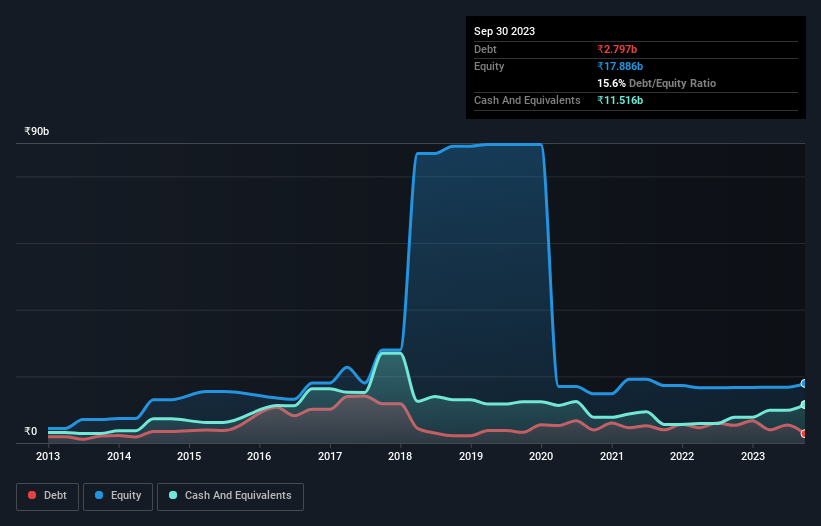
Warren Buffett famously said, 'Volatility is far from synonymous with risk.' So it might be obvious that you need to consider debt, when you think about how risky any given stock is, because too much debt can sink a company. As with many other companies Thomas Cook (India) Limited (NSE:THOMASCOOK) makes use of debt. But should shareholders be worried about its use of debt?
What Risk Does Debt Bring?
Generally speaking, debt only becomes a real problem when a company can't easily pay it off, either by raising capital or with its own cash flow. Ultimately, if the company can't fulfill its legal obligations to repay debt, shareholders could walk away with nothing. However, a more frequent (but still costly) occurrence is where a company must issue shares at bargain-basement prices, permanently diluting shareholders, just to shore up its balance sheet. Having said that, the most common situation is where a company manages its debt reasonably well - and to its own advantage. When we examine debt levels, we first consider both cash and debt levels, together.
View our latest analysis for Thomas Cook (India)
What Is Thomas Cook (India)'s Debt?
The image below, which you can click on for greater detail, shows that Thomas Cook (India) had debt of ₹2.80b at the end of September 2023, a reduction from ₹5.30b over a year. But on the other hand it also has ₹11.5b in cash, leading to a ₹8.72b net cash position.

A Look At Thomas Cook (India)'s Liabilities
We can see from the most recent balance sheet that Thomas Cook (India) had liabilities of ₹34.3b falling due within a year, and liabilities of ₹10.2b due beyond that. Offsetting this, it had ₹11.5b in cash and ₹8.31b in receivables that were due within 12 months. So its liabilities total ₹24.6b more than the combination of its cash and short-term receivables.
This deficit isn't so bad because Thomas Cook (India) is worth ₹63.8b, and thus could probably raise enough capital to shore up its balance sheet, if the need arose. But it's clear that we should definitely closely examine whether it can manage its debt without dilution. While it does have liabilities worth noting, Thomas Cook (India) also has more cash than debt, so we're pretty confident it can manage its debt safely.
It was also good to see that despite losing money on the EBIT line last year, Thomas Cook (India) turned things around in the last 12 months, delivering and EBIT of ₹2.6b. There's no doubt that we learn most about debt from the balance sheet. But ultimately the future profitability of the business will decide if Thomas Cook (India) can strengthen its balance sheet over time. So if you're focused on the future you can check out this free report showing analyst profit forecasts.
But our final consideration is also important, because a company cannot pay debt with paper profits; it needs cold hard cash. While Thomas Cook (India) has net cash on its balance sheet, it's still worth taking a look at its ability to convert earnings before interest and tax (EBIT) to free cash flow, to help us understand how quickly it is building (or eroding) that cash balance. Over the last year, Thomas Cook (India) actually produced more free cash flow than EBIT. That sort of strong cash conversion gets us as excited as the crowd when the beat drops at a Daft Punk concert.
Summing Up
Although Thomas Cook (India)'s balance sheet isn't particularly strong, due to the total liabilities, it is clearly positive to see that it has net cash of ₹8.72b. The cherry on top was that in converted 336% of that EBIT to free cash flow, bringing in ₹8.6b. So we don't have any problem with Thomas Cook (India)'s use of debt. When analysing debt levels, the balance sheet is the obvious place to start. But ultimately, every company can contain risks that exist outside of the balance sheet. For instance, we've identified 2 warning signs for Thomas Cook (India) that you should be aware of.
Of course, if you're the type of investor who prefers buying stocks without the burden of debt, then don't hesitate to discover our exclusive list of net cash growth stocks, today.
Valuation is complex, but we're here to simplify it.
Discover if Thomas Cook (India) might be undervalued or overvalued with our detailed analysis, featuring fair value estimates, potential risks, dividends, insider trades, and its financial condition.
Access Free AnalysisHave feedback on this article? Concerned about the content? Get in touch with us directly. Alternatively, email editorial-team (at) simplywallst.com.
This article by Simply Wall St is general in nature. We provide commentary based on historical data and analyst forecasts only using an unbiased methodology and our articles are not intended to be financial advice. It does not constitute a recommendation to buy or sell any stock, and does not take account of your objectives, or your financial situation. We aim to bring you long-term focused analysis driven by fundamental data. Note that our analysis may not factor in the latest price-sensitive company announcements or qualitative material. Simply Wall St has no position in any stocks mentioned.
About NSEI:THOMASCOOK
Thomas Cook (India)
Offers integrated travel services in India and internationally.
Excellent balance sheet and fair value.
Similar Companies
Market Insights
Community Narratives




